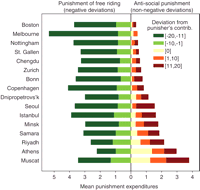 In fact, there is a trend the other way – the less religious a society is, the lower the levels of antisocial behaviour. At least according to a new study out today in Science.
In fact, there is a trend the other way – the less religious a society is, the lower the levels of antisocial behaviour. At least according to a new study out today in Science.
The study took groups of students from 15 universities around the world and studied them as they played a game of co-operation. Players could either keep tokens for themselves, or contribute them to the common pot for the benefit of everyone. They were also allowed to punish players they thought were freeloaders, in an effort to keep them in line.
In some groups, the freeloaders hit back, punishing the others in a tit-for-tat cycle of anti-social behaviour. In these groups, co-operation the same as elsewhere at the start, but rapidly plummeted.
The red bars on the graph above show the levels of anti-social behaviour – worst in Saudi Arabia (Riyadh), Greece (Athens), and Oman (Muscat); best in the USA (Boston), Australia (Melbourne) and the UK (Nottingham).
Lead author Simon Gaechter, Professor of the Psychology of Economic Decision-Making at The University of Nottingham, explained:
“Our results correlate with other survey data in particular measures of social norms of civic co-operation and rule of law in these same societies. The findings suggest that in societies where public co-operation is ingrained and people trust their law enforcement institutions, revenge is generally shunned. But in societies where the modern ethic of co-operation with unrelated strangers is less familiar and the rule of law is weak, revenge is more common.
In an accompanying commentary, Herbert Gintis, (professor of economics at the Central European University), said:
“The authors’ empirical results show that the advanced market societies with democratic institutions produce an ethic of spontaneous cooperation, with a strong altruistic dimension, that likely accounts at least in part for their material success and legitimacy, says Gintis. He adds that the results must be validated and extended before we firm conclusions can be drawn.
One of the potential explanations the authors looked at is the relationship between antisocial punishment and the national score on a “traditional-secular” scale, derived from the World Values Survey. They found no relationship (see supplemental material online):
With regard to the value orientations investigated by Inglehart and co-workers we find that the dimension “traditional vs. secular-rational values” has no explanatory power (probably because in this dimension we do not have much variability across the societies of our subject pools)
Now, there are a number of problems here. Students are not necessarily representative of wider society. More highly educated people tend to be less religious and more secular, and this relationship might be stronger in countries in which few people have access to higher education.
Furthermore, a country like the USA may score low on secular-rational values, even though there are outposts of common sense. So Boston may not be representative. Lastly, secular values are highly correlated with the factors that were found to influence antisocial behaviour (democratic societies with high levels of civic trust) – so teasing out the explanatory factors is tricky.
But what this study does do is bang yet another nail in the coffin of the argument that secularisation and removal of religion from the public sphere is bad for societal health.
B. Herrmann, C. Thoni, S. Gachter (2008). Antisocial Punishment Across Societies Science, 319 (5868), 1362-1367 DOI: 10.1126/science.1153808
Gintis H. BEHAVIOR: Punishment and Cooperation. Science 7 March 2008:1345-1346. DOI: 10.1126/science.1155333














